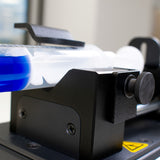Syringe Pumps
Syringe pumps (also known as syringe drivers) carefully control fluid delivery during experiments. Single channel syringe pumps can move one syringe at a time, while dual channel syringe pumps control two in tandem. With them, you can control the dispense rates of solutions with a degree of accuracy, repeatability and precision that would be impossible to obtain by hand.
Some benefits of using our laboratory syringe pumps include:
- High levels of control in both infusion and withdrawal modes at a wide range of flow rates.
- Easily programmable and can save up to 10 programmes of up to 100 steps. This will allow you to perform complex routines and experiments.
- Low price but high quality. A precise stepper motor with microstepping technology provides an excellent degree of accuracy and reduces any flow rate fluctuations.
Our syringe pumps can easily integrated with other pieces of equipment. The Ossila Slot Die Coater uses a single syringe pump to supply a precisely control the rate of flow of the solution to the slot die head.
Two models of syringe pump are available: the Ossila Single Syringe Pump and the Ossila Dual Syringe Pump. In addition, if you want use your syringe pump to standardize your thin film coating processes, our spin coating kit offers excellent value. We also sell multiple syringe pump accessories, all of which are available to buy worldwide either online or via our customer support team.
Browse Syringe Pumps and Accessories
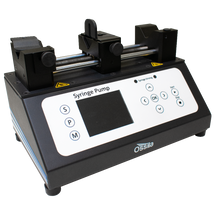
Single Syringe Pump
Our lowest price syringe pump, the Ossila Single Syringe Pump is an affordable, but fully featured, laboratory syringe pump. Suitable for any application that requires the infusion or extrusion of one solution at a time. Reliable, programmable, and precise. Covered by our two-year warranty and eligible for free worldwide shipping.

Dual Syringe Pump
The Dual Syringe Pump is our most versatile model. Using the in-built software, you can program each pump completely independently of the other; having a dual syringe pump is like have two single syringe pumps, but without the cost or space requirements. It also brings the added flexibility of being able to run both pumps together. Covered by our two-year warranty and eligible for free worldwide shipping.
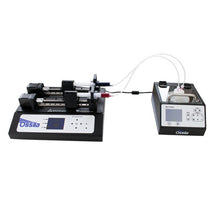
Spin Coating Kit
Available with either our single or dual action syringe pump, our spin coating kit also includes an Ossila Spin Coater, fifteen 5 ml Norm-Ject Disposable Luer Lock Syringes, five lengths of PTFE tubing with Luer Lock adapters, and a spin coater adapter to hold the needles in position above your substrate. Sold at a discounted price compared to when bought separately.
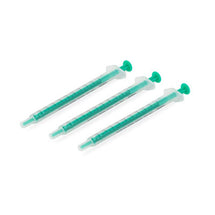
Norm-Ject Disposable Luer Lock Syringes
Although our syringe pumps are compatible with all the major brands of plastic and glass syringes, we recommend Norm-Ject syringes for most applications. Norm-Ject syringes are one of the few that are made of solvent-resistant plastic and have a tight seal that does not use rubber. They also feature Luer lock attachments, the gold standard for securing attaching needles and syringe filters.
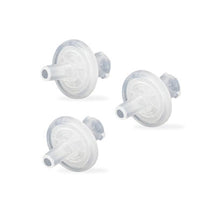
Syringe Filters
We sell a range of syringe filters. Five different membrane materials are available in a range of diameters and pore sizes. With Luer lock connectors, all our syringe filters are compatible with Norm-Ject syringes. Choose the specific syringe filter you need on our syringe filter product page. If you are not sure which type would best suit your application, contact us for free technical advice.
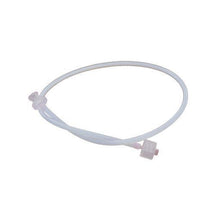
Luer Lock PTFE Tubing
Get up and running faster by using pre-assembled PTFE tubing with Luer connections. Compatible with Norm-Ject syringes and our syringe filters, and a useful spare for use with the Ossila Slot-Die Coater or the Ossila Syringe Pump (in conjunction with a connector kit). Sold in packs of five, using separate lengths of PTFE tubing for each solution reduces the chance of contamination.
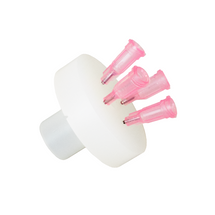
Syringe Pump Spin Coater Connector Kit
Connect your syringe pump to the Ossila Spin Coater. The coater connector kit contains Luer Lock PTFE tubing, a pack of blunt Luer Lock needles, and an adapter which fits the spin coater lid. The adapter can hold up to four 2.5 cm (1 inch) needles in place and has a central hole for precise manual disposition. Included free with the spin coating kit.
Single or Double Syringe Pump
Whether you need a double or single syringe pump depends largely on the experiment you are doing.
| Single Syringe Pump | Dual Syringe Pump | |
|---|---|---|
| Benefits |
|
|
| Limitations |
|
|
| Example Applications |
|
|
Key Features
There are a wide variety of syringe pumps available on the market. Understanding the key features is critical in making the right choice for your experiment.
Compatible with Wide Range of Syringes
A syringe pump is only as good as the syringes that you can use with it. Our syringe pumps are compatible with many of the leading brands of syringe, but we recommend using Norm-Ject disposable Luer Lock syringes.
Channel Independence
Many syringe pumps only have a single motor to move all the syringes. This means that when one syringe dispenses, all syringes dispense. If you want to use multiple syringes with different pump rates, channel independence (available with our dual pump model) is critical.
Withdrawal and Infusion: Push/pull Syringe Pumps
Our systems clamp the syringe plunger, so that when the motor moves backwards, it can drag the plunger backwards too. This means you can use both of our syringe pumps in withdrawal or infusion mode.
Flow Rate Range
The Ossila syringe pumps have a wide range of adjustable dispense/withdrawal rates so you can choose the speed to suit your syringe and desired flow rate.
Pump Force
In the context of a syringe pump, there is a maximum lateral force that the motor can exert on the syringe plunger. Larger motors tend to be able to produce a higher force. This will allow you to move high viscosity liquids or use smaller diameter pipes.
As an additional safety measure, our single syringe pump and dual syringe pump offer force control so that you can set a maximum allowed force. This is particularly useful when you need to protect delicate syringes such as those made from glass or plastic.








